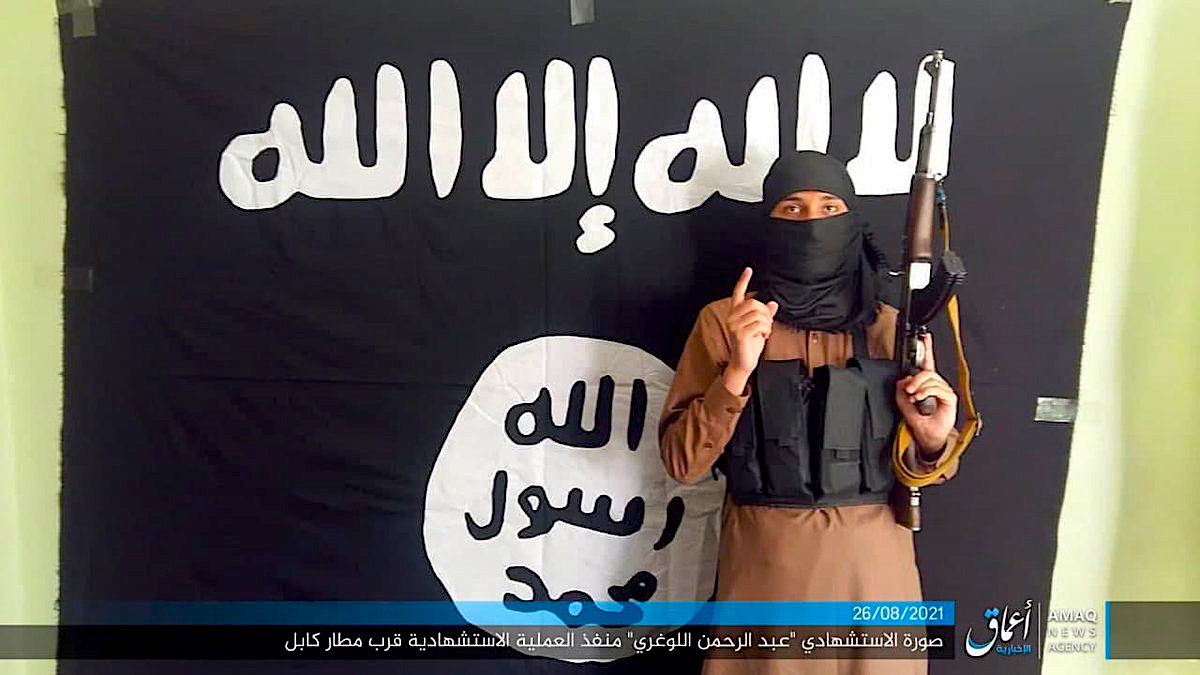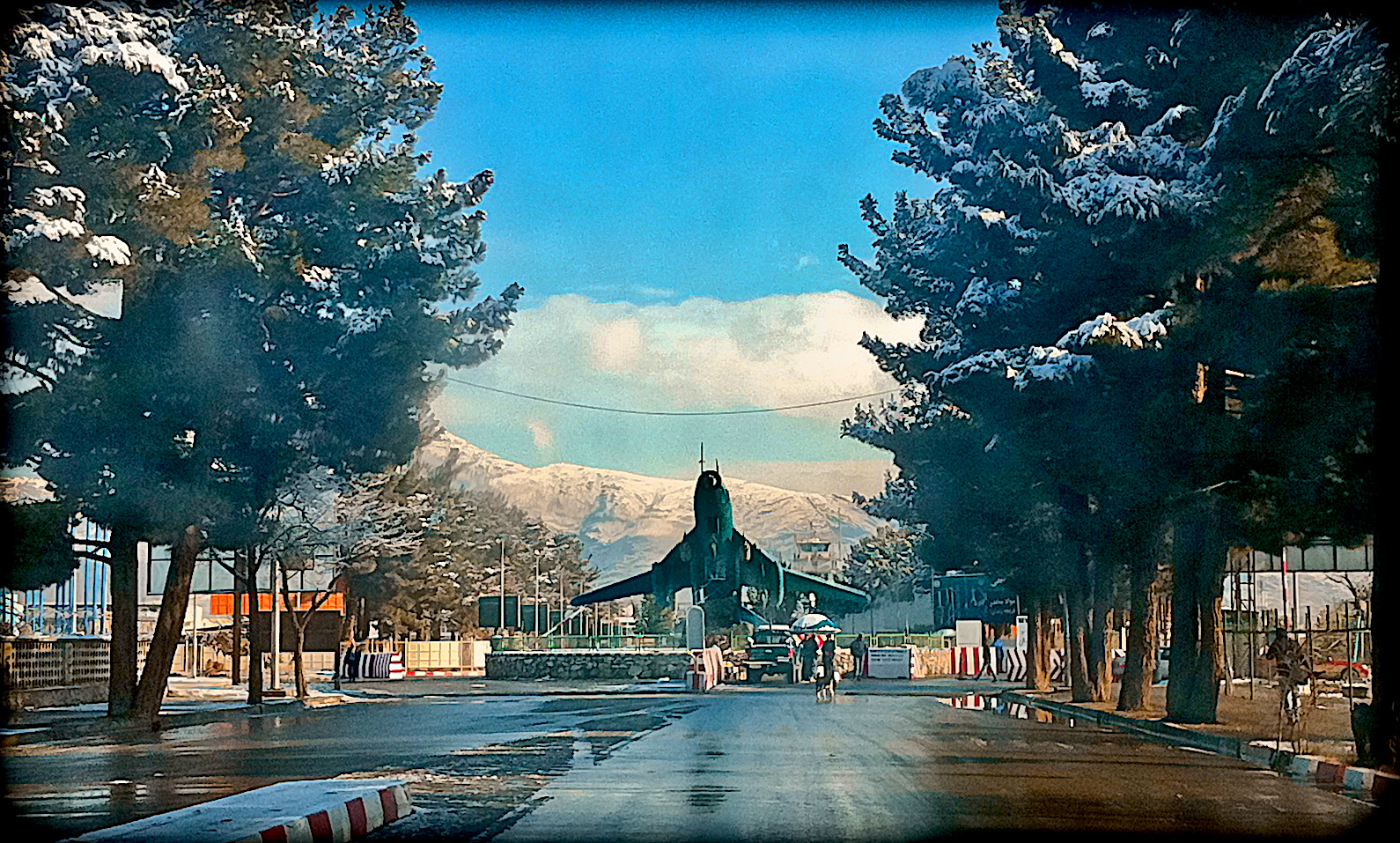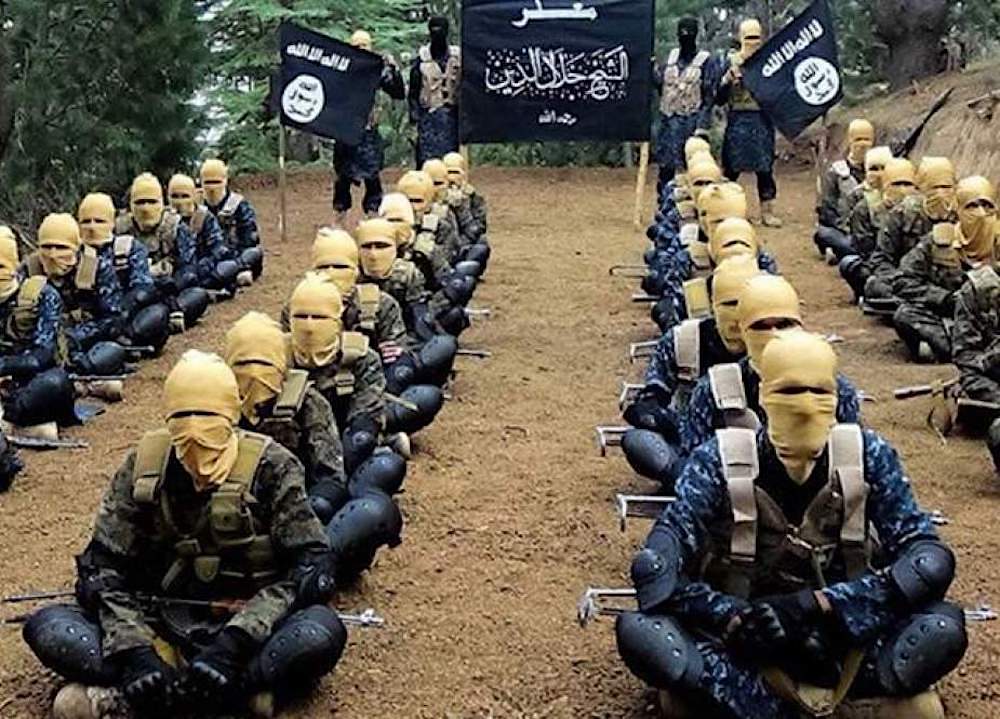ISIS-Khorasan aims to prove to Afghans and to the outside world that the Taliban cannot secure the capital, writes Pepe Escobar.
By Pepe Escobar
The Asia Times

The horrific Kabul suicide bombing introduces an extra vector in an already incandescent situation: It aims to prove to Afghans and to the outside world that the nascent Islamic Emirate of Afghanistan is incapable of securing the capital.
As it stands, at least 103 people – 90 Afghans (including at least 28 Taliban) and 13 American servicemen – were killed and at least 1,300 injured, according to the Afghan Health Ministry.
Responsibility for the bombing came via a statement on the Telegram channel of Amaq Media, the official Islamic State (ISIS) news agency. This means it came from centralized ISIS command, even as the perpetrators were members of ISIS-Khorasan, or ISIS-K.
Presuming to inherit the historical and cultural weight of ancient Central Asian lands that from the time of imperial Persia stretched all the way to the western Himalayas, that spin-off defiles the name of Khorasan.
The suicide bomber who carried out “the martyrdom operation near Kabul airport” was identified as one Abdul Rahman al-Logari. That would suggest he’s an Afghan, from nearby Logar province. And that would also suggest that the bombing may have been organized by an ISIS-Khorasan sleeper cell. Sophisticated electronic analysis of their communications would be able to prove it – tools that the Taliban don’t have.
The way social media-savvy ISIS chose to spin the carnage deserves careful scrutiny. The statement on Amaq Media blasts the Taliban for being “in a partnership” with the U.S. military in the evacuation of “spies.”
It mocks the “security measures imposed by the American forces and the Taliban militia in the capital Kabul,” as its “martyr” was able to reach “a distance of no less than five meters from the American forces, who were supervising the procedures.”
So it’s clear that the newly reborn Islamic Emirate of Afghanistan and the former occupying power are facing the same enemy. ISIS-Khorasan comprises a bunch of fanatics, termed takfiris because they define fellow Muslims – in this case the Taliban – as “apostates.”
Founded in 2015 by emigré jihadis dispatched to southwest Pakistan, ISIS-K is a dodgy beast. Its current head is one Shahab al-Mujahir, who was a mid-level commander of the Haqqani network headquartered in North Waziristan in the Pakistani tribal areas, itself a collection of disparate mujahideen and would-be jihadis under the family umbrella.
Washington branded the Haqqani network as a terrorist organization way back in 2010, and treats several members as global terrorists, including Sirajuddin Haqqani, the head of the family after the death of the founder Jalaluddin.
Up to now, Sirajuddin was the Taliban deputy leader for the eastern provinces – on the same level with Mullah Baradar, the head of the political office in Doha, who was actually released from Guantanamo in 2014.
Crucially, Sirajuddin’s uncle, Khalil Haqqani, formerly in charge of the network’s foreign financing, is now in charge of Kabul security and working as a diplomat 24/7.
The previous ISIS-K leaders were snuffed out by U.S. airstrikes in 2015 and 2016. ISIS-K started to become a real destabilizing force in 2020 when the regrouped band attacked Kabul University, a Doctor Without Borders maternity ward, the presidential palace and the airport.
NATO intel picked up by a UN report attributes a maximum of 2,200 jihadis to ISIS-K, split into small cells. Significantly, the absolute majority are non-Afghans: Iraqis, Saudis, Kuwaitis, Pakistanis, Uzbeks, Chechens and Uighurs.
The real danger is that ISIS-K works as a sort of magnet for all manners of disgruntled former Taliban or discombobulated regional warlords with nowhere to go.
The Perfect Soft Target
The civilian commotion these past few days around Kabul airport was the perfect soft target for trademark ISIS carnage.
Zabihullah Mujahid – the new Taliban minister of information in Kabul, who in that capacity talks to global media every day – is the one who actually warned NATO members about an imminent ISIS-K suicide bombing. Brussels diplomats confirmed it.
In parallel, it’s no secret among intel circles in Eurasia that ISIS-K has become disproportionally more powerful since 2020 because of a transportation ratline from Idlib, in Syria, to eastern Afghanistan, informally known in spook talk as Daesh Airlines.
Moscow and Tehran, even at very high diplomatic levels, have squarely blamed the U.S.-U.K. axis as the key facilitators. Even the BBC reported in late 2017 on hundreds of ISIS jihadis given safe passage out of Raqqa, and out of Syria, right in front of the Americans.
The Kabul bombing took place after two very significant events.
The first one was Mujahid’s claim during an American NBC News interview earlier this week that there is “no proof” Osama bin Laden was behind 9/11 – an argument that I had already hinted was coming in this podcast the previous week.
This means the Taliban have already started a campaign to disconnect themselves from the “terrorist” label associated with 9/11. The next step may involve arguing that the execution of 9/11 was set up in Hamburg, the operational details coordinated from two apartments in New Jersey.
Nothing to do with Afghans. And everything staying within the parameters of the official narrative – but that’s another immensely complicated story.
The Taliban will need to show that “terrorism” has been all about their lethal enemy, ISIS, and way beyond old school al-Qaeda, which they harbored up to 2001. But why should they be shy about making such claims? After all, the United States rehabilitated Jabhat Al-Nusra – or al-Qaeda in Syria – as “moderate rebels.”
The origin of ISIS is incandescent material. ISIS was spawned in Iraq prison camps, its core made of Iraqis, their military skills derived from ex-officers in Saddam’s army, a wild bunch fired way back in 2003 by Paul Bremmer, the head of the Coalition Provisional Authority.
ISIS-K duly carries the work of ISIS from Southwest Asia to the crossroads of Central and South Asia in Afghanistan. There’s no credible evidence that ISIS-K has ties with Pakistani military intel.
On the contrary: ISIS-K is loosely aligned with the Tehreek-e-Taliban (TTP), also known as the Pakistani Taliban, Islamabad’s mortal enemy. TTP’s agenda has nothing to do with the moderate Mullah Baradar-led Afghan Taliban who participated in the Doha process.
SCO to the Rescue
The other significant event tied to the Kabul bombing was that it took place only one day after yet another phone call between Presidents Vladimir Putin and Xi Jinping.
The Kremlin stressed the pair’s “readiness to step up efforts to combat threats of terrorism and drug trafficking coming from the territory of Afghanistan”; the “importance of establishing peace”; and “preventing the spread of instability to adjacent regions.”
And that led to the clincher: They jointly committed to “make the most of the potential” of the Shanghai Cooperation Organization (SCO), which was founded 20 years ago as the “Shanghai Five”, even before 9/11, to fight “terrorism, separatism and extremism.”
The SCO summit is next month in Dushanbe – when Iran, most certainly, will be admitted as a full member. The Kabul bombing offers the SCO the opportunity to forcefully step up.
Whichever complex tribal coalition is formed to govern the Islamic Emirate of Afghanistan, it will be intertwined with the full apparatus of regional economic and security cooperation, led by the three main actors of Eurasia integration: Russia, China and Iran.
The record shows Moscow has all that it takes to help the Islamic Emirate against ISIS-K in Afghanistan. After all, the Russians flushed ISIS out of all significant parts of Syria and confined them to the Idlib cauldron.
In the end, no one aside from ISIS wants a terrorized Afghanistan, just as no one wants a civil war in Afghanistan. So the order of business indicates not only an SCO-led frontal fight against existing ISIS-K terror cells in Afghanistan but also an integrated campaign to drain any potential social base for the takfiris in Central and South Asia.
Pepe Escobar, a veteran Brazilian journalist, is the correspondent-at-large for Hong Kong-based Asia Times. His latest book is “2030.” Follow him on Facebook.
This article is from The Asia Times.
The views expressed are solely those of the author and may or may not reflect those of Consortium News.




For more from Pepe Escobar see his interview with the Grayzone here: hXXps://thegrayzone.com/2021/08/21/us-afghanistan-pullout-cia-opium-pipeline/
Enjoy!!
Pepe Escobar has posted a video, today, August 28, 2021, of an interview with a street journalist, Faisal, of a military officer who examined the bodies of those killed.
The officer states that most of the 100+ victims died of bullet wounds that indicate that the tightly pressed together crowd were shot from above, and that only about 20 victims were killed by the bomb.
The BBC’s coverage includes witnesses who claimed that U$ troops fired on the crowd.
Speculation suggests that other “actors” were also firing into the crowd from
elevated positions which some have suggested might be the input of a certain intelligence agency.
Doubtless, this will remain a mystery, as do so many things, in this best of all possible worlds.
What is the video url?
The video is contained in the article.
Pepe knows so much that it is dizzying even to read it, but it is valuable to help us connect up so many parts of the story.
You da Man, Pepe. Thanks.
Thank you…
RE: “The origin of ISIS is incandescent material. ISIS was spawned in Iraq prison camps, its core made of Iraqis, their military skills derived from ex-officers in Saddam’s army, a wild bunch fired way back in 2003 by Paul Bremmer, the head of the Coalition Provisional Authority.”
so sad that we have too much hubris to learn or admit to ourselves that what comes around goes around….
and catches innocent victims all around in the repercussions…
I’m beginning to think that creating enemies is intentional and comes from the very top in order to perpetuate the “need” for military spending for profit – enriching what Julian Assange referred to as :
“a transnational security elite” that seems to have our “leaders’ by the short hairs.
for example Cheney serving Halliburton’s interests during the Iraq War…
Why does this make me believe that Rhainer Shea’s analysis of why the US left Afghanistan is right on? Shea proposed that it was to extend the chaos from Afghanistan into Xinjiang through that very narrow corridor of Afghanistan that runs between Tajikistan and Pakistan.
Anyone else recall Seymour Hersch’s report about how the USA helped al Qaeda escape Tora Bora? There are also reports that the CIA supported “Daesh Airlines” to fly ISIS from Syria to Afghanistan.
Of course, this theory is not fantastic enough to be considered “the truth”. So who was it that sent all that anthrax around Washington DC?
ISIS got back its old gig with the CIA.
Pepé always nails it .It will be interesting to see what develops on the OBL front having been accused for the 9/11 and this mentioned in this article for being negated by the Taliban .Many of us have questioned the ability of OBL to plan and conduct this crime on 9/11.
Not that I am ready to trust the Taliban but it is worth noting .
With everything that has transpired since that event ,trust in government has been seriously eroded.
Centuries of US lies are starting to fall one by one.
Informative as always Pepe. The world has to get the US out of both Syria and Iraq (whose govs have both said Get out and been ignored) to end the supply of Islamic zealots that the US has created. And somebody needs to take the Saudis out behind the woodshed and explain with a blunt object that they can’t ship their flavor of Islamic fanaticism out across the Middle East. I don’t have a problem with Islam, I’ve lived in the Middle East. I have a problem with a problem with Zealots and Fanatics regardless of which sky god they pledge their obeisance to.
The world has to get the US out of the United Nations.
The US has never abided by the UN Charter; thus it has no grounds for belonging to the UN let alone the Security Council.
That “supply of Islamic zealots” via CIA/House of Saud has a long and ugly, disgusting history, including the terror unleashed on Russia in the 90s and early 2000s from Chechnya. What a litany of horrors, including massacring hundreds of children in Moscow. It wasn’t enough that the Russians were driven from Afghanistan, the CIA’s part in the century-old Mackinder-Rhodes Grand Chessboard dictated that Russia’s government be further destabilized, just as they were beginning to recover from the Wall Street / Chicago School raiders and interlopers. And of course, that plan continues today.
I recall President Putin at one point around 2016 responding to the Saudi king’s threat to unleash further Takfiris into the Russian heartland with a quite graphic rejoinder, the precise blunt words currently escape me, but did include “we will turn your desert kingdom into glass.” Period.
One always wonders who finances these seemingly patchwork militias, made up of disgruntled jihadists from far and wide. Uncovering these mysteries might explain a lot.
What seems to be conspicuously absent from all punditry on the Afghan quagmire, is that the declared rationale for the 2001 invasion by the U.S. was 9/11. The only problem with that is that the hijackers were Saudis, therefore it seems like Bush and Cheney attacked the wrong country? I mean countries, plural, after also attacking Iraq for the expressed reason of ties to Al-queda, and therefore 9/11?! Meanwhile Saudis come out smelling like a rose? WTF? And then we have ignored any and all connections between the attacks and the kingdom of Saudi Arabia, even to the extent that they are our big ally to this day?! It must seem strange to all of the other Middle Eastern people that the US never stopped bitching about 9/11 and terrorism for decades and then do absolutely nothing punitive toward the country from which the hijackers came?! The only way to avoid all of these quagmires is to get out, and stay out.
I wonder who paying their bills? Amerika?
here’s the answer
hXXps://adamtooze.substack.com/p/chartbook-35-its-not-the-fall-that?token=eyJ1c2VyX2lkIjoxMTM1NjQsInBvc3RfaWQiOjQwNTA0OTM1LCJfIjoicU1UQTIiLCJpYXQiOjE2MzAxNTYxMjcsImV4cCI6MTYzMDE1OTcyNywiaXNzIjoicHViLTE5Mjg0NSIsInN1YiI6InBvc3QtcmVhY3Rpb24ifQ.teQ5gNYr2rlYVxLbrnGfGu2UrnOvopWviZVrPbpQLRI
It’s all speculation now, but we know that the U.S. has helped finance, arm and shield ISIS and Al Nusra in Syria, so why would they not be willing to do the same in Afghanistan? Hell, it wouldn’t even be the first time—remember the 1980s? But I think that Pepe is right about Russia being prepared to aid in crushing the troublemakers. I also expect that many Afghan citizens will serve as the eyes and ears of the government, supplying vital info about ISIS-K whereabouts and planning. With the U.S. no longer in-country, it will be difficult for them to provide support.
Thierry Meyssan says the recruitment of jihadists in Idlib has happened under the auspices of the Turkish military. The US aim is to keep Afghanistan destabilized in line with the admiral Cebrowski strategy.
hXXps://www.voltairenet.org/article213772.html